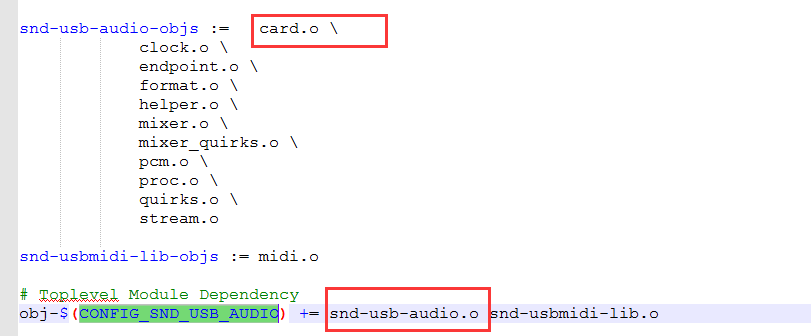一個正常的UAC設備插入Android 7.0是預設打開UAC配置的,列印的log如下: 而Android4.0是沒有預設打開,是需要進行相應的配置的;這裡可以看到其驅動程式為snd-usb-audio,依據這個關鍵詞在內核中查找到如下內容: 需要在 /kernel/arch/arm/configs ...
一個正常的UAC設備插入Android 7.0是預設打開UAC配置的,列印的log如下:
[ 2367.490491] usb 3-3.2: new full-speed USB device number 9 using xhci_hcd [ 2367.580010] usb 3-3.2: New USB device found, idVendor=0d8c, idProduct=0132 [ 2367.580018] usb 3-3.2: New USB device strings: Mfr=1, Product=2, SerialNumber=0 [ 2367.580023] usb 3-3.2: Product: USB PnP Audio Device [ 2367.580027] usb 3-3.2: Manufacturer: C-Media Electronics Inc. [ 2367.581679] input: C-Media Electronics Inc. USB PnP Audio Device as /devices/pci0000:00/0000:00:14.0/usb3/3-3/3-3.2/3-3.2:1.2/0003:0D8C:0132.0004/input/input18 [ 2367.581999] hid-generic 0003:0D8C:0132.0004: input,hidraw3: USB HID v1.11 Device [C-Media Electronics Inc. USB PnP Audio Device] on usb-0000:00:14.0-3.2/input2 [ 2367.913280] usbcore: registered new interface driver snd-usb-audio
而Android4.0是沒有預設打開,是需要進行相應的配置的;這裡可以看到其驅動程式為snd-usb-audio,依據這個關鍵詞在內核中查找到如下內容:
1 root@ubuntu:/home/lh/work/git/ML16/kernel# grep "registered new interface driver" ./ -rn 2 ./drivers/usb/core/driver.c:914: pr_info("%s: registered new interface driver %s\n",
需要在 /kernel/arch/arm/configs目錄下增加msm8916_defconfig和msm8916-perf_defconfig配置;
在AndroidBoard.mk就已經定義了我們kernel配置文件的屬性:

CONFIG_SND_USB_AUDIO=y就行了,因為sound/usb/中的makefile包含了:

在sound/usb/card.c
1 static struct usb_driver usb_audio_driver = { 2 .name = "snd-usb-audio", 3 .probe = usb_audio_probe, 4 .disconnect = usb_audio_disconnect, 5 .suspend = usb_audio_suspend, 6 .resume = usb_audio_resume, 7 .id_table = usb_audio_ids, 8 .supports_autosuspend = 1, 9 };
根據probe方法snd_usb_audio_probe調用了snd_usb_apply_boot_quirk和snd_card_register,查到了:
1 static int usb_audio_probe(struct usb_interface *intf, 2 const struct usb_device_id *id) 3 { 4 struct snd_usb_audio *chip; 5 chip = snd_usb_audio_probe(interface_to_usbdev(intf), intf, id); 6 if (chip) { 7 usb_set_intfdata(intf, chip); 8 return 0; 9 } else 10 return -EIO; 11 } 12 13 14 // linux-3.4.y/sound/usb/quirks.c 15 int snd_usb_apply_boot_quirk(struct usb_device *dev, 16 struct usb_interface *intf, 17 const struct snd_usb_audio_quirk *quirk) 18 { 19 u32 id = USB_ID(le16_to_cpu(dev->descriptor.idVendor), 20 le16_to_cpu(dev->descriptor.idProduct)); 21 22 switch (id) { 23 case USB_ID(0x041e, 0x3000): 24 /* SB Extigy needs special boot-up sequence */ 25 /* if more models come, this will go to the quirk list. */ 26 return snd_usb_extigy_boot_quirk(dev, intf); 27 28 case USB_ID(0x041e, 0x3020): 29 /* SB Audigy 2 NX needs its own boot-up magic, too */ 30 return snd_usb_audigy2nx_boot_quirk(dev); 31 32 case USB_ID(0x10f5, 0x0200): 33 /* C-Media CM106 / Turtle Beach Audio Advantage Roadie */ 34 return snd_usb_cm106_boot_quirk(dev); 35 36 case USB_ID(0x0d8c, 0x0102): 37 /* C-Media CM6206 / CM106-Like Sound Device */ 38 case USB_ID(0x0ccd, 0x00b1): /* Terratec Aureon 7.1 USB */ 39 return snd_usb_cm6206_boot_quirk(dev); 40 41 case USB_ID(0x133e, 0x0815): 42 /* Access Music VirusTI Desktop */ 43 return snd_usb_accessmusic_boot_quirk(dev); 44 45 case USB_ID(0x17cc, 0x1000): /* Komplete Audio 6 */ 46 case USB_ID(0x17cc, 0x1010): /* Traktor Audio 6 */ 47 case USB_ID(0x17cc, 0x1020): /* Traktor Audio 10 */ 48 return snd_usb_nativeinstruments_boot_quirk(dev); 49 case USB_ID(0x0763, 0x2012): /* M-Audio Fast Track Pro USB */ 50 return snd_usb_fasttrackpro_boot_quirk(dev); 51 } 52 53 return 0; 54 }
snd_usb_audio_probe:
1 /* 2 * probe the active usb device 3 * 4 * note that this can be called multiple times per a device, when it 5 * includes multiple audio control interfaces. 6 * 7 * thus we check the usb device pointer and creates the card instance 8 * only at the first time. the successive calls of this function will 9 * append the pcm interface to the corresponding card. 10 */ 11 static struct snd_usb_audio * 12 snd_usb_audio_probe(struct usb_device *dev, 13 struct usb_interface *intf, 14 const struct usb_device_id *usb_id) 15 { 16 const struct snd_usb_audio_quirk *quirk = (const struct snd_usb_audio_quirk *)usb_id->driver_info; 17 int i, err; 18 struct snd_usb_audio *chip; 19 struct usb_host_interface *alts; 20 int ifnum; 21 u32 id; 22 23 alts = &intf->altsetting[0]; 24 ifnum = get_iface_desc(alts)->bInterfaceNumber; 25 id = USB_ID(le16_to_cpu(dev->descriptor.idVendor), 26 le16_to_cpu(dev->descriptor.idProduct)); 27 if (quirk && quirk->ifnum >= 0 && ifnum != quirk->ifnum) 28 goto __err_val; 29 30 if (snd_usb_apply_boot_quirk(dev, intf, quirk) < 0) 31 goto __err_val; 32 33 /* 34 * found a config. now register to ALSA 35 */ 36 37 /* check whether it's already registered */ 38 chip = NULL; 39 mutex_lock(®ister_mutex); 40 for (i = 0; i < SNDRV_CARDS; i++) { 41 if (usb_chip[i] && usb_chip[i]->dev == dev) { 42 if (usb_chip[i]->shutdown) { 43 snd_printk(KERN_ERR "USB device is in the shutdown state, cannot create a card instance\n"); 44 goto __error; 45 } 46 chip = usb_chip[i]; 47 chip->probing = 1; 48 break; 49 } 50 } 51 if (! chip) { 52 /* it's a fresh one. 53 * now look for an empty slot and create a new card instance 54 */ 55 for (i = 0; i < SNDRV_CARDS; i++) 56 if (enable[i] && ! usb_chip[i] && 57 (vid[i] == -1 || vid[i] == USB_ID_VENDOR(id)) && 58 (pid[i] == -1 || pid[i] == USB_ID_PRODUCT(id))) { 59 if (snd_usb_audio_create(dev, i, quirk, &chip) < 0) { 60 goto __error; 61 } 62 snd_card_set_dev(chip->card, &intf->dev); 63 chip->pm_intf = intf; 64 break; 65 } 66 if (!chip) { 67 printk(KERN_ERR "no available usb audio device\n"); 68 goto __error; 69 } 70 } 71 72 /* 73 * For devices with more than one control interface, we assume the 74 * first contains the audio controls. We might need a more specific 75 * check here in the future. 76 */ 77 if (!chip->ctrl_intf) 78 chip->ctrl_intf = alts; 79 80 chip->txfr_quirk = 0; 81 err = 1; /* continue */ 82 if (quirk && quirk->ifnum != QUIRK_NO_INTERFACE) { 83 /* need some special handlings */ 84 if ((err = snd_usb_create_quirk(chip, intf, &usb_audio_driver, quirk)) < 0) 85 goto __error; 86 } 87 88 if (err > 0) { 89 /* create normal USB audio interfaces */ 90 if (snd_usb_create_streams(chip, ifnum) < 0 || 91 snd_usb_create_mixer(chip, ifnum, ignore_ctl_error) < 0) { 92 goto __error; 93 } 94 } 95 96 /* we are allowed to call snd_card_register() many times */ 97 if (snd_card_register(chip->card) < 0) { 98 goto __error; 99 } 100 101 usb_chip[chip->index] = chip; 102 chip->num_interfaces++; 103 chip->probing = 0; 104 mutex_unlock(®ister_mutex); 105 return chip; 106 107 __error: 108 if (chip) { 109 if (!chip->num_interfaces) 110 snd_card_free(chip->card); 111 chip->probing = 0; 112 } 113 mutex_unlock(®ister_mutex); 114 __err_val: 115 return NULL; 116 }
probe依次調用了:
1 snd_usb_apply_boot_quirk 2 snd_usb_audio_create 3 snd_usb_create_quirk 4 snd_usb_create_streams 5 snd_usb_create_stream 6 snd_usb_parse_audio_interface 這裡根據usb的信息解析成pcm參數(如聲道數量,採樣率等等) 7 8 snd_usb_create_mixer 9 snd_card_register
總結:
UAC設備的參數是通過USB描述符確定的。比如聲道是bNrChannels,位深是bBitResolution,採樣率是bSamFreqType。截取其中一段說明:
bNrChannels 1 bSubframeSize 2 bBitResolution 16 bSamFreqType 7 Discrete tSamFreq[ 0] 8000 tSamFreq[ 1] 11025 tSamFreq[ 2] 16000 tSamFreq[ 3] 22050 tSamFreq[ 4] 32000 tSamFreq[ 5] 44100 tSamFreq[ 6] 48000聲道1,位深16,波特率8000~48000。



